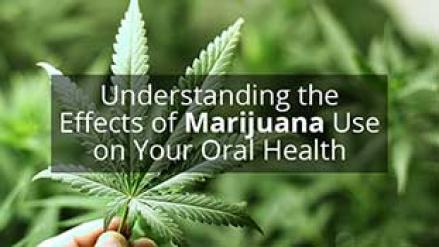October 22, 2018

With the recent legalization of marijuana in Canada, there are many issues affecting public health that are left unanswered. There are many possible therapeutic uses for cannabinoids (the active ingredients in marijuana) that are under investigation, including treatment of chronic pain, inflammation, and epilepsy, but there is not yet sufficient evidence in any area of research that can allow a medical regulatory body to make broad recommendations for its use to treat any disease routinely.
One of the biggest issues with any naturally occurring therapeutic product is that it is difficult to control the dose delivered to the patient. Cannabis use can interact with many medications and can increase risk of developing respiratory and cardiovascular events. In addition, use of marijuana prior to 18 years old results in a reduction of up to 20 IQ points later in age, with some studies showing permanent effects in users up to 25 years old!
In terms of oral health, the biggest concerns associated with marijuana use stem from the dry mouth symptoms that persist with chronic use. Saliva is the body’s main method of delivering immune factors to fight dental bacteria. We also benefit from its natural rinsing effect to remove debris and bacterial colonies from the mouth. Smoking marijuana regularly will depress saliva flow consistently and will result in staining of teeth, development of decay and periodontal bone loss, which will eventually result in tooth loss. Regular exposure to smoke in the oral cavity whether from tobacco or marijuana has a negative effect on the tissues in the mouth, increasing the risk of oral cancer. Vaping or e-cigarettes decrease this risk, but do not eliminate it completely.
To reduce the risk of developing dry mouth and oral cancer, cannabis users should avoid smoking the product. Ingestion of the product in pill or spray form, as well as edible products should be considered. Dosage can be controlled much better through this delivery method as well.
Dentists do not prescribe medical marijuana, as there is no evidence of therapeutic benefit for patients with TMJ problems, post-op pain, or neurological issues in the head and neck area.
If you are a marijuana user, it is important to tell your dentist. We need to know what medications you are taking (and cannabis is a medication!) so that we can cater your prescriptions to the potential interactions with marijuana. Also, active users are legally impaired, and should not be providing consent to treatment. As regular cannabis use becomes more common there needs to be transparency about use, so that we can provide the best possible care for you.
Read more about cannabis and your dental procedures in the British Columbia Dental Assocation's "Patient Information Bulletin"